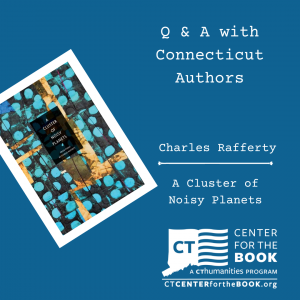Book Voyagers / Cartooning Workshop
Book Voyagers / Cartooning Workshop
Level up your drawing skills with author and graphic illustrator...

Registration is open for the 2022 Connecticut Book Awards!
When: October 23, 2022 | 3:00-5:00 p.m.
Where: Hartford Public Library
Please note that clicking the button will bring you to another site for registration.
COVID is still with us, although easing off a little, thank goodness. Did you have a favorite comfort genre to turn to when things were looking bleak? Something that lifted you away and to a different place for a while?
My favorite genre remains poetry. I have an eclectic taste, so I don’t find myself returning to any one type of poetry. The ability to surprise is the only criterion I’m interested in.
Where do you get your inspiration?
I can get inspiration from anywhere – the more random and oblique the inspiration, the better. It can be a bit of overheard conversation, something I see happening in the river, or just the chance combination of phrases that strike me as unlikely or surprising. I go for a walk in the woods every day, which is where I do my best thinking.
Who made reading important to you?
Stephen Dunn had the biggest direct influence on my reading life. He pointed me in the direction of many writers who would become touchstones for me – Mark Strand and James Dickey and Donald Justice.
Where is your favorite place to read?
I can read anywhere, though these days the couch is the most likely place you’d find me. When I was still commuting to work each day, I got most of my reading done on the train. I read in bed too – but that’s usually a short-lived effort.
What book do you return to most often, whether passages or whole?
I keep coming back to the work of Arthur Rimbaud – particularly Illuminations. I love the boldness of his brief career – his willingness to reinvent himself and his poetry repeatedly.
What are you reading now?
I’m reading the journals I have subscriptions to – Poetry, The New Yorker, The Southern Review, etc. I also recently picked up a copy of James Dickey’s The Suspect in Poetry. I don’t always agree with his opinions, but I like a critic whose opinions are strong ones. He either loves it or hates it. I’m not interested in critics with carefully couched positions.
Charles Rafferty is the author of 14 poetry books and chapbooks, most recently A Cluster of Noisy Planets (BOA, 2021), The Problem With Abundance (Grayson Books, 2019) Something an Atheist Might Bring Up at a Cocktail Party (Mayapple Press, 2018), and The Smoke of Horses (BOA Editions, 2017). His stories have been collected in Saturday Night at Magellan’s (Fomite Press, 2013) and Somebody Who Knows Somebody (Gold Wake Press, 2021). His poems have appeared in Gettysburg Review; The New Yorker; O, The Oprah Magazine; Ploughshares; Prairie Schooner; Rhino; and The Southern Review. Currently, he co-directs the MFA program at Albertus Magnus College and teaches in the Westport Writers’ Workshop. He lives in Sandy Hook, CT.
Charles Rafferty’s latest collection of prose poems turns philosophical. In A Cluster of Noisy Planets, Rafferty captures the rhythms and patterns of life as a lover, father, and poet, distilling each moment to its essence and grounding them collectively in the wider perspective of a changing world, the constant turning of the stars and the changing seasons of the New England countryside. With a knowing nod to the passage of time—day to day, year to year, epoch to epoch—these lyrical poems form a record of the profound, ephemeral joys, losses, and echoes of commonplace moments.